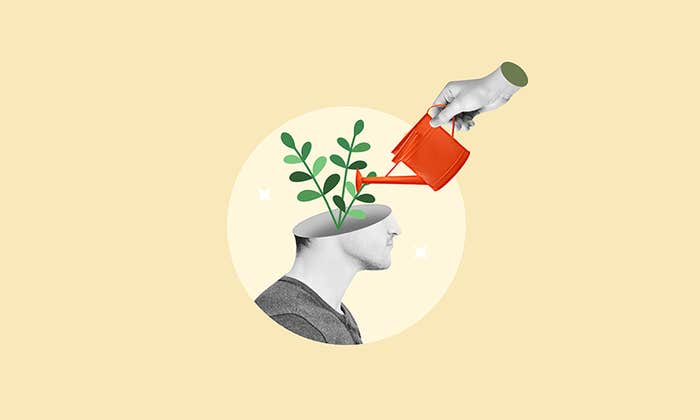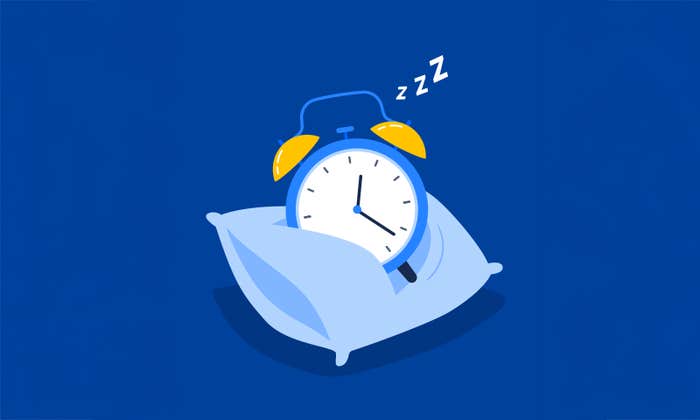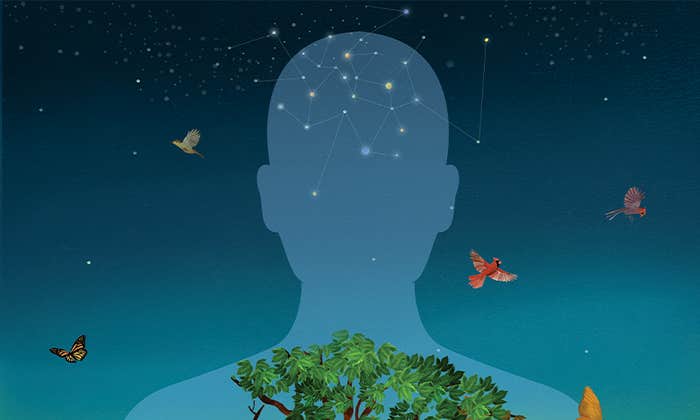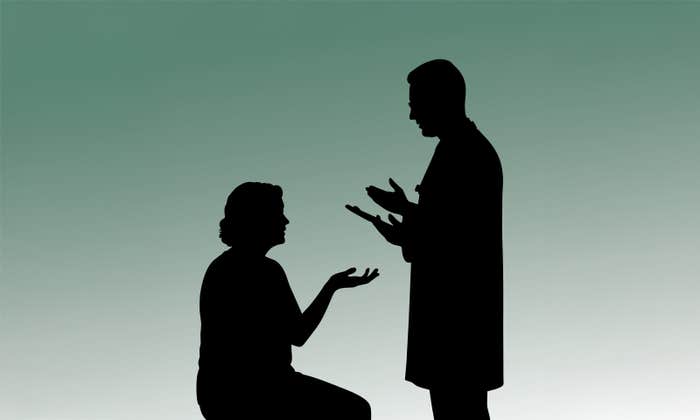In my memories of the Scottish hospital, the sky is always blue, though I know that can’t be completely accurate. Summer was waning, and as my friends and I had already experienced, Edinburgh was prone to unpredictable storms. Yet, I can’t think of a single moment of rain in the two weeks I lay in bed. My morphine-soaked haze only allowed glimpses and fragments: the bracing air coming in from an open window, the rough comfort of my mother’s fingers wiping my fever-moist brow, my father’s tears. All of that must have been confusing to me, but when I think of this time, I remember more clarity than confusion. I remember the Quiet.
This was not a Quiet I had known before. It was a placid current, a presence more than an absence. Everything I saw or touched or heard pulsed with a marvelous sense of order. I had a nothing mind, a flotsam mind. I was incredibly focused on the present, with very little awareness or interest in my past or future. My entire environment felt interconnected, like cells in a large, breathing organism. To experience this Quiet was to be it.
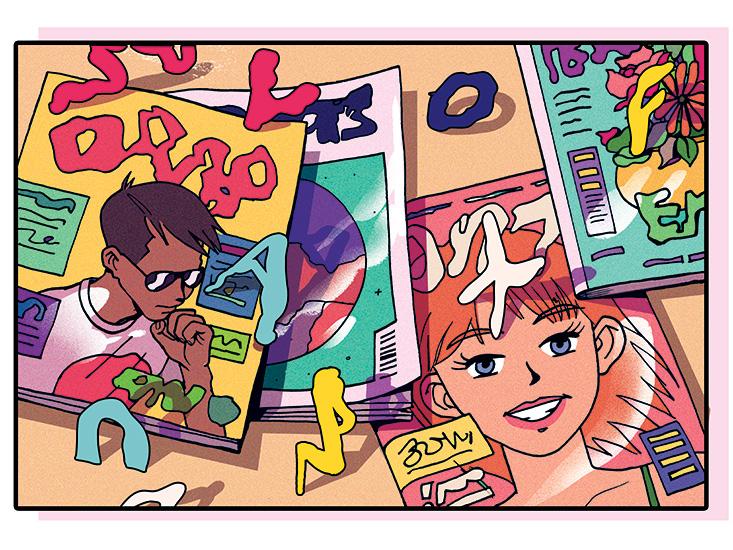
However, this sense of serenity was not shared by those around me. After I had collapsed in an Edinburgh bar while singing karaoke, and the medics had taken me away in an ambulance, my friends called my parents in the United States. It was the middle of the night in Edinburgh, but early evening in Los Angeles, and no one was overly worried about my fall from the stage, since it appeared I was suffering a simple concussion. That all changed two hours after my hospital admission—when the results of my CT scan showed the actual crisis unfolding. An aneurysm had ruptured in my brain and the hemorrhage was spreading. A neuroradiologist explained to my parents how precarious my situation was—how often people died the instant an aneurysm ruptured, and even after treatment, only slightly more than half of these patients actually survive the next few days. With every second being critical, the doctor was preparing for an emergency operation. But my now-horrified parents were stranded in California. Their passports were in their safety deposit box, and the bank branch was closed for the night. My parents rattled on the windows of the bank the next morning, successfully convincing the bank to open early for them because there was no time to waste. My procedure was well under way when my parents boarded their flight the next morning, leaving my brother and grandmother behind at the house. The operation was already over when they got to Edinburgh. My parents and friends came together, relieved that I had survived the operation, but living with a keen awareness of how perilous my situation still was.
It took a few days for me to wake up fully, under the influence of a combination of swollen brain tissue and heavy sedation. However, when I was more alert, the Quiet I found myself experiencing was much more interesting than my medical state. I had woken up to a new world, hushed and full of curiosities.
This was the very moment I became aware I couldn’t read anymore.
One of these moments of marvel took place during a move between the critical unit and the recovery ward. I was being transported in a mirrored elevator, and although there were no bandages on my face and my vision was clear, it was almost impossible for me to recognize my own reflection. Yet, somehow, this didn’t disturb me. In fact, it made remarkable sense because I was quickly realizing that my reflection was not the only thing that was different. Transformation felt abundant. Once-fixed concepts, like “wall” and “window,” weren’t as easy to identify anymore, and the differences between “he” and “she” and “I” and “it” were becoming indistinguishable. I knew my parents were my parents and my friends were my friends, but I felt less like myself and more like everything around me.
I was wheeled to a bed by a westerly-facing window, with three other women in the room. My suitemates were often in discussion with one another. Even through their brogues, I understood what they were saying, but I rarely took part in the conversations. I just enjoyed the way their voices plodded and pattered like footsteps.
At this point I didn’t know much about my brain injury at all. I wasn’t in any pain, so my thoughts about my new condition were unfocused and fleeting. Instead of being occupied by questions about why I was in the hospital and what had happened to me, my mind was engrossed in an entirely different set of perceptions. The smallest of activities would enthrall me. Dressing myself, I was awed by the orbital distance between cloth and flesh. Brushing my teeth, I was enchanted by the stiffness of the bristles and the sponginess of my gums. I also spent an inordinate amount of time looking out the window. My view was mainly of the hospital’s rooftop, with its gray and untextured panels, though I developed a lot of interest in a nearby tree. I could only make out the tops of the branches, but I’d watch this section of needles and boughs intently, fascinated by how the slightest wind would change the shape entirely. It was always and never the same tree.
Very few things disturbed me during this period of time. But even in this formless daydream I remember the moment that most closely resembled real distress. Or, at least, when I became aware of an actual loss.
It must have been midday because the sunlight was falling across my body, and that slat of light emphasized the white nightstand on my left. My parents had filled the shelves inside with clothing, and the nurses made sure there were plenty of liquids for me to drink in there, too. On this day, I noticed that there was a stack of magazines on the nightstand, as well as a book. I am not sure how long they had been there—for all I knew, they could have even predated my arrival—but this was the first time they piqued my interest.
The high gloss of the magazine cover felt wet in my hands. And as I opened it up, I was instantly bombarded with photos of red carpet parades and illustrated makeup tips, a circus of color and distraction. I couldn’t linger anywhere. It felt as if the magazine were shouting at me. Closing it was a relief.
I turned to the book. It was a novel by Agatha Christie, something I had probably read many years earlier. I opened to Chapter One and flipped slowly and evenly through the first few pages, a motion that seemed to come naturally to me. But on the third page, I stopped. I returned to the first page and started again. Slower this time. Much slower. My eyes focused and refocused in the bright sunlight, but I continued to only see the black, blocked shapes where words used to be.
Thinking about it now, I don’t know how I could be so certain that it was an Agatha Christie novel, especially since this was the very moment I became aware I couldn’t read anymore. With this simultaneously familiar and unfamiliar book in my hands, I first took in the actual loss of words. For my entire life, language had been at the forefront of every personal or professional achievement, and very few things had brought me as much joy and purpose. If I had ever been warned that I might be robbed of my ability to read, even for a limited amount of time, it would have been a devastation too cruel to bear. Or so I would have thought. But a day did come when I couldn’t read the book in front of me, when paragraphs appeared to be nothing more than senseless jumbles, and the way I actually processed this massive loss was surprisingly mild. The knowledge of the failure was jarring, without a doubt, but was there any misery or angst? No. My reaction was much less sharp. A vague sense of disappointment swept through me, but then … my inability to use words in this way just felt like transient information. Now that the ability was gone, I could no longer think of how or why it should have any influence on my life whatsoever.
It’s shocking to reflect on that moment, and think about how the loss of something so crucial washed past me with such a vague wisp of emotion. But I was living so deeply in the present—and in the comfort of the Quiet—I couldn’t fully realize how my sense of identity had shifted. It would be several weeks before I detected how much of myself had gone missing, and how hard I’d have to fight to regain it. However, the unpleasant sensations that came with holding that book drifted away as soon as I closed it. And with no effort at all, my attention settled back on the impossible blue sky.
A few days after the surgery and a battery of tests, Dr. Rustam Al-Shahi Salman, the consultant neurologist overseeing my case, made my parents aware of the short- and long-term issues at hand. Dr. Salman was slim and soft-spoken, his gestures and words thoughtful, and he was never rushed, a demeanor that fit nicely in the Quiet I now inhabited. He was also probably the first person who used the word “aphasia” with my family. However, he explained it in much more detail with my parents than with me.
He told my parents that aphasia did not attack a person’s cognitive abilities and most often left a person’s intelligence completely intact. But this condition could manifest quite differently in different people, and aphasia is generally divided into two categories: receptive and expressive. Expressive aphasia (also called “non-fluent” or “Broca’s” aphasia) is characterized by word-finding difficulties, while receptive aphasia (also called “fluent” or “Wernicke’s” aphasia) affects language comprehension. The expressive issues were most pronounced in my case, but in the beginning, I struggled with receptive issues, too, unable to detect the missing or garbled parts of my own language.
The speech and language therapist Dr. Salman appointed to me aimed to change that.
Anne Rowe was near my mother’s age, with faded red curls cut close to her head. For a while, it seemed to me that her only job was to hand me worksheets. Piles and piles of worksheets. One of the first worksheets she gave me had a panel of faces. Every day I was instructed to point at the bald man in the images to tell her how I was feeling.
I feel fine, I said. Or thought I said. But Anne would insist on a more in-depth answer.
Why don’t you just try to point to the picture that feels most appropriate for you? she would ask.
It didn’t occur to me then that Anne was employing this image prompt not as an exercise but a necessity—because most of the time she couldn’t understand my responses to her questions. While my expressive aphasia prevented me from speaking clearly, my receptive aphasia prevented me from knowing when my language was not clear. According to my parents, in the first two weeks I could only say 40 or 50 words.
Anne’s records from our initial sessions mention that creating the sounds for speech was often challenging for me too: “Lauren is able to use fully intact phrases at times without hesitation, but has clear difficulties with word finding and motor planning for speech.” This meant I had trouble shaping my mouth to make the right sounds—a condition known as speech apraxia, which often accompanies an onset of aphasia. Children go through a similar process, stuttering into speech while parents ask them to repeat and refine what they are saying until they do it correctly. Anne’s worksheets had the same goal. Pointing at a drawing of a mouth, she’d say: The tip of the tongue goes here. …
Then she would illustrate on her own face: T, T, T, Teh, is the tip of the tongue. Th, Th, Th is Thuh, the fat part of the tongue.
I wasn’t disturbed when Anne asked me to take part in these articulation exercises. They didn’t indicate to me that there was something especially wrong. In fact, they strongly resembled the routine vocal warm-ups I had been doing—and enjoying—since theater school. Asking an actor to demonstrate the difference between a P sound and a B sound over and over was nothing out of the ordinary. When I was instructed to do so in the hospital, I assumed I was excelling at it, flexing my muscle memory, until Anne subtly indicated my failures and misfires with her feedback throughout our sessions.
Very good, she’d say. Or: Not exactly, try again.
At some point, I realized that Anne was saying “not exactly” a lot. And if we hit too many “try agains,” Anne would suggest we move on to something else for a while. It was a major hint that something was amiss. I didn’t know exactly what was wrong, but I would try to fix it because I preferred positive feedback to negative.
Without language, I was paying attention to the world in a new way.
One week after the rupture, Anne administered the Western Aphasia Battery test on me. After the reading section, she made this note: “Testing was stopped as Lauren was becoming distressed. L. is very aware she could not do task.” Though I have a hard time remembering this distress, I trust in Anne’s reporting. My best guess is that my anxiety was only skin-deep and short-lived. I also believe my awareness was more limited than Anne might have assumed. I probably wasn’t thinking about my inability to do this task and how that might affect my limitations on future tasks. At the time, I had very little concern for the past or future; but in the present, I simply didn’t like to disappoint. That, more than anything, was probably the source of my distress. Lucky for me, though, it didn’t last long. In the way I perceived the world, negative impressions could pass very quickly, as if I had never even had them.
My trouble with spoken language was mirrored in my written language. I discovered as I progressed in my sessions with Anne that I had not completely forgotten the alphabet, but I had forgotten its order. If I isolated single letters at a time, I could still identify them on a page. It took a lot of guidance from Anne, but with her by my side, I could slowly sound out these letters, occasionally creating a very fragile word. Anne noted: “There are frequent errors reading aloud, especially words with irregular pronunciations, and Lauren finds it difficult to know if she is correct or not.” So, while I had not lost my ability to read entirely, “reading” in this new iteration of my life involved a razor-sharp focus, accommodating only a word at a time. I also wasn’t able to know my own accuracy without someone else’s support. I would slowly sound out a word, but it took so long that when I went on to tackle the next one, I often would forget what I had just read. Perhaps that was what had happened with the Agatha Christie book I had attempted to read by myself. I had been expecting the language on the page to behave the way it used to, and when it didn’t, the whole picture crumbled in front of me. Words could be approachable in small, isolated units. But a full sentence? That was beyond imagining.
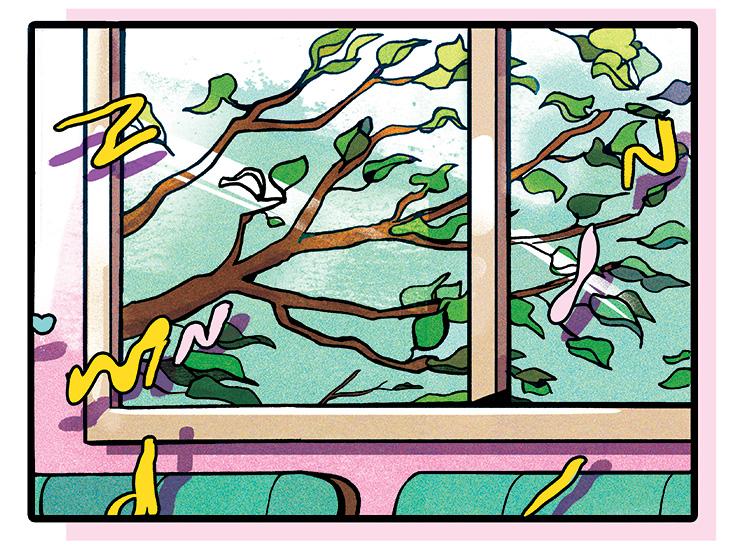
I realize now that Anne was trying to address a systematic failure in me: my newly acquired aphasia. I just couldn’t think of it like that. I could flip-flop in our exchanges and not hear the mistakes. When I did, I would assume I was simply tired or that the disturbances were all minor and temporary. And as soon as our session would end, I would gently be redelivered to the happy stillness of the pervasive Quiet.
My life had always been populated with big personalities, and I had created different approaches as a way to interact with each of them—as a daughter, as an older sister, as an actress, as a roommate, as a girlfriend. Before the stroke, my ability to appreciate the needs and desires of these complex characters around me came pretty easily. But after the stroke, my emotional sensitivity had dulled tremendously. It was hard to know what other people might be thinking, and I wasn’t that interested in finding out. My general disinterest in interpersonal interactions was probably rooted in both emotional and anatomical aspects.
The rupture had originated on the middle cerebral artery in the left hemisphere of my brain, bleeding into the Sylvian fissures and my left basal ganglia. This cerebral artery supplies the blood for the two language centers of the brain—Broca’s area and Wernicke’s area. The basal ganglia are usually associated with motor control, but they also affect habits, cognition, and emotion. Some basal injuries can blunt emotional awareness and slow “goal-directed” activity. With such a wide range of influences, the alterations to the basal ganglia were probably affecting me in many ways at the time, but after the rupture, it was my faltering language that was my most visible symptom.
My aphasia had invisible effects, too, in ways that many people wouldn’t even think about. It was not just my external language that was ailing. My inner monologue, my self-directed speech, had also gone almost completely mute. In its place was the radiant Quiet. The nourishing Quiet. The illuminating Quiet.
The Quiet was not something I spoke to anyone about. While my parents were on alert for signs of a secondary stroke (vasospasms are common after a rupture), I was happy enough floating in this meditative state. It felt deeply unique to me, but I later learned of other people (who also sustained damage to the left hemisphere of the brain) who have reported similar phenomena. Clinical psychologist Scott Moss describes waking up in the hospital with his own aphasia. His account is included in Injured Brains of Medical Minds. He writes:
I did comprehend somewhat vaguely what was said to me. … I didn’t have any difficulty focusing: It was simply that the words, individually or in combination, didn’t have meaning, and even more amazing, I was only a trifle bothered by that. … I had also lost the ability even to engage in self-talk. … I simply existed. … It was as if without words I could not be concerned about tomorrow.
And Jill Bolte Taylor, a Harvard-trained neuroanatomist, who is well-known for being the author of the bestseller My Stroke of Insight, lost this inner monologue as well. She describes it as “brain chatter” that was “replaced by a pervasive and enticing inner peace.” In addition, she writes that she “didn’t think in the same way,” partially because of the “dramatic silence that had taken residency” in her. Bolte Taylor specifically identifies her perceptual changes as related to a shift of attention between the two hemispheres of her brain.
In The Master and His Emissary: The Divided Brain and the Making of the Western World, psychiatrist and writer Iain McGilchrist goes much further into detail about the differences between these hemispheres. The brain looks like a walnut split down the middle, and its two halves are called hemispheres. Each is a fully functional processing unit, like a PC and Mac side by side in the skull. Though they usually work together to create a seemingly uniform worldview, a human being can live with only one functional hemisphere, or one hemisphere can do the heavy lifting while the other is under repair (as is often the case for a person who has suffered a stroke). McGilchrist takes issue with the pseudoscience of people calling themselves “left-brained” or “right-brained,” but that being said, the hemispheres do have different strengths, or as McGilchrist describes it, their differences deal with “competing needs” and “the types of attention they are required to bring to bear on the world.” This bifurcated arrangement doesn’t just exist in humans, but in most vertebrates, too. In a single moment, a bird, using its left hemisphere, must identify if an item is food or sand and using its right hemisphere, simultaneously be on guard for predators. McGilchrist mentions that these are “two quite different kinds of exercise, requiring not just that attention should be divided, but that it should be two distinct types [of attention] at once.”
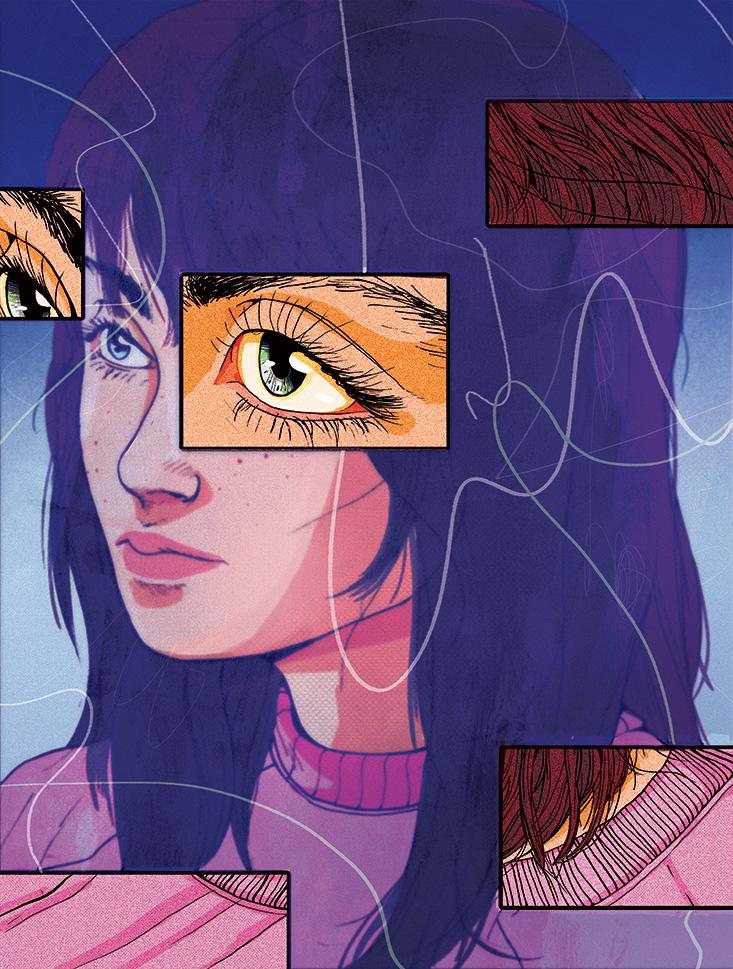
These hemispheric differences are not so divergent in humans, only more sophisticated. Our left hemisphere is much more detail-focused, and since both language centers exist on this side of the brain, it is much more verbal. But the right hemisphere has a keen awareness, too, and it is more vigilant than the left, more receptive to new information. McGilchrist writes:
The left hemisphere’s “stickiness,” its tendency to recur to what it is familiar with, tends to reinforce whatever it is already doing. There is a reflexivity to the process, as if trapped in a hall of mirrors: It only discovers more of what it already knows, and it only does more of what it already is doing. The right hemisphere by contrast [is] seeing more of the picture, and taking a broader perspective.
This description resonates intensely with me. Without language, I was paying attention to the world in a new way. Without the talents and abilities I had once relied on—and used to identify myself—I was interacting with more ineffable senses. I had escaped from my old hall of mirrors, and with my language-dominant left hemisphere somewhat disabled, I was probably taking in a whole host of perceptions from the right hemisphere that were suddenly prioritized.
I was experiencing a near-constant sensation of interconnectedness, but my observations often lacked specific categories and dimensions, and a sense of my own personal preference. My “self” didn’t seem at all pertinent in this kind of processing. It was all happening to me and through me, but not necessarily because of me.
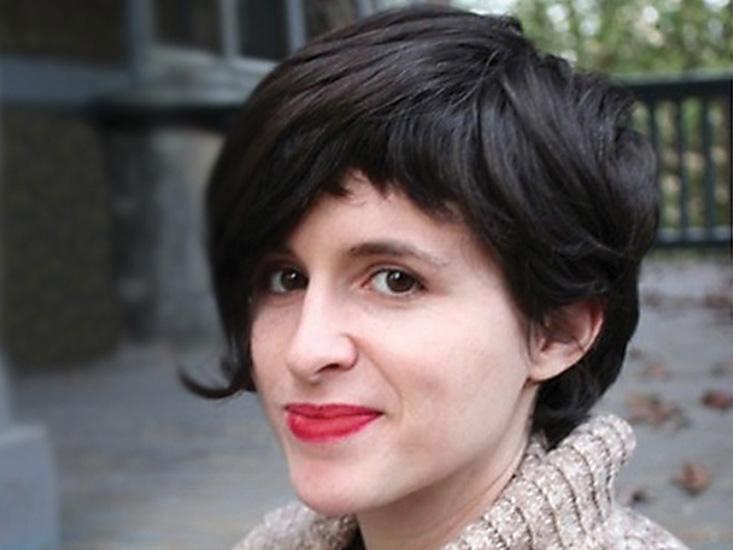
I believe this temporary shift—changing the dominance from one hemisphere to the other and losing my inner voice for a while—was a huge part of what made the Quiet so quiet. The constant stream of language, which I had always assumed was thought, had stopped. It’s hard to describe this voice exactly, and even harder to describe its lack. It is the internal monologue that turns on in the morning, when we instruct ourselves to “Get up” and “Make breakfast.” It’s a voice we use to monitor ourselves, to criticize or to doubt—and it can be pernicious this way. However, it can be an effective tool as well. We can motivate ourselves with it, understand our environment better, and sometimes modify our situations as well. My inner speech returned very slowly, not on a certain day, but in bits and bobs. In the hospital, though, I didn’t realize that I no longer had access to it, only that something in me felt substantially … different.
However, I certainly was able to think after the aneurysm’s rupture. In many ways, my thinking had never been clearer. I retained the capacity for complex thought, but it was not represented by words or phrases, and my ideas didn’t cluster or activate one another the same way. It wasn’t ignorance, but there was an element of innocence.
And on the whole, this silence served me very well. With my internal monologue on mute, I was mainly spared from understanding my condition early on. Unable to ask myself: What is wrong with me? I could not, and did not, list the many things that were.
I was no longer the narrator of my own life.
Ten years later, after another major surgery and countless hours of formal and informal language therapy, I have regained much of my linguistic capacity. How much is lost forever, I’ll never know. I cannot promise that I am much like the person I was five years ago, or 15 years ago, or that I will be the same person 50 seconds from now. But I know experiences like this are not limited to people who have had brain injuries. Anytime we talk about our childhood, or any other distant period of our lives, we have to accommodate multiple versions of ourselves—even though we don’t sound, or speak, or even think, like these people anymore. My changes were more swift than many. But we all contain these kinds of multitudes.
We are rarely prepared for the next stages in our lives, and we lurch forward into positions we are not equipped for, without the expertise we might sorely need. With that in mind, perfection can never be the goal. But fluidity might be. And sometimes without exactly realizing it, in the process of doing what we are doing, we become the people who are capable of doing it.
Language was both my injury and the treatment of that injury, and in many ways, I have been writing my way back to fluency. I suspect I will continue to keep reaching out for language, even when it falls short. Speech, overt or covert, can be such a gift, but sometimes it is at its best when it isn’t being used at all.
How beautiful a word can be. Almost as beautiful as the silence that precedes it.
Lauren Marks is an advocate for those who live with language disorders like aphasia. In 2011, she was an Emerging Voices Fellow for PEN Center USA. A Stitch of Time is her first book.
Copyright © 2017 by Lauren Marks. From the forthcoming book A Stitch of Time: The Year a Brain Injury Changed My Language and Life by Lauren Marks to be published by Simon & Schuster, Inc. Printed by permission.


















